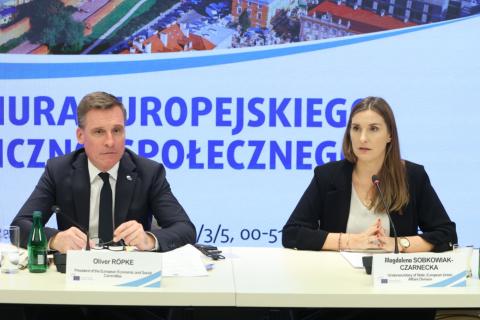European Economic
and Social Committee
Security at the forefront of Poland’s vision for the upcoming Polish EU Presidency
At the meeting of the European Economic and Social Committee (EESC) in Warsaw, the Polish Undersecretary of State, Magdalena Sobkowiak-Czarnecka, outlined the political direction of the rotating presidency her country will hold at the Council of the European Union from January to June 2025.
The central theme of the presidency is ‘security’, structured around seven key pillars: external, energy, economic, food, climate, health and information. This comprehensive approach aims to address Europe’s most pressing challenges during the six-month Polish Presidency of the Council of the European Union starting in January 2025.
Speaking at the extraordinary EESC Bureau meeting held in Warsaw on 19 November 2024, Magdalena Sobkowiak-Czarnecka, Polish Undersecretary of State for European Union Affairs, made it clear that the presidency would try to adopt an approach that combined climate goals and economic competitiveness, which could not afford to be at odds with each other.
‘Security is our motto, and this will be the focus of our presidency; however, this catalogue of pillars is not closed,’ she said. ‘We will be very much open to dialogue, and security will also relate to civil society and to increasing citizens’ resilience. For this reason, we will set up two committees within the Prime Minister’s office to constantly listen to NGOs and entrepreneurs.’
For his part, the EESC president, Oliver Röpke, stressed the critical importance of reimagining security in a world defined by rapid change and complex challenges: ‘From safeguarding our physical and digital landscapes to protecting the values that unite us as Europeans, it is clear that security is not merely a defensive posture; it is a proactive commitment to resilience, cooperation, and trust,’ he said.
‘Poland’s upcoming presidency comes at a time when Europe is facing many challenges, but also many opportunities. We look forward to supporting the Polish presidency’s work, for example through the requested exploratory opinions, in order to advance our shared European goals,’ he added.
More specifically, the Polish EU Presidency is expected to work on:
- External and Military Security - Addressing the ongoing war in Ukraine, financing the ‘East Shield’, and fostering a robust European defence industry.
- Energy Security - Reducing reliance on external energy sources, accelerating the energy transition with European-led technologies, and lowering energy costs.
- Economic Security - Reforming the EU’s Multiannual Financial Framework, increasing the availability of European funds for beneficiaries and strengthening cohesion policy under the slogan ‘more power to regions, less power to Brussels’.
- Food and Climate Security - Bridging the gap between agriculture and climate activism, with a commitment to competitiveness and a practical climate framework.
- Health Security - Strengthening EU independence in medicine production and addressing mental health challenges, especially among children and youth.
- Information Security - Combating disinformation, improving cybersecurity, and managing the impact of virtual reality on mental health, particularly for younger generations.
The Polish commitment to artificial intelligence is in line with the key message sent during the conference on The Social and economic consequences of digital transformation, organised by the EESC and held the day before, on 18 November 2024.
The two sessions of the conference were entitled Labour market in the digital era: new story about employment and Digital revolution: Is everybody on board? and featured a number of prominent speakers.
Agnieszka Dziemianowicz-Bąk, the Polish Minister for Family, Labour and Social Policy, stressed the importance of being prepared for technological change, without being dramatic, fatalistic, or fearful. This objective can be achieved by reskilling those workers who will be impacted and by adopting regulations and global standards at European level.
Aleksandra Przegalińska-Skierkowska, Vice-Rector for International Cooperation at the Koźmiński University in Warsaw, said that it was good to focus on collaborative artificial intelligence, which sought to help people rather than replace them, and quoted research concluding that workers using artificially intelligence were generally happier at work, but also raised the question as to who would be leading artificial intelligence developments in the future.
Mr Röpke emphasised that the digital transformation offered unparalleled opportunities, but also posed significant social challenges that the EU had to address in order to build an inclusive future for all: ‘The digital transformation offers profound opportunities, but requires us to act thoughtfully to ensure it benefits all. By prioritising education, well-being, access, and fairness, we can shape a future where technology enhances, rather than divides, our society.’
Downloads
-
Security at the forefront of Poland’s vision for the upcoming Polish EU Presidency
